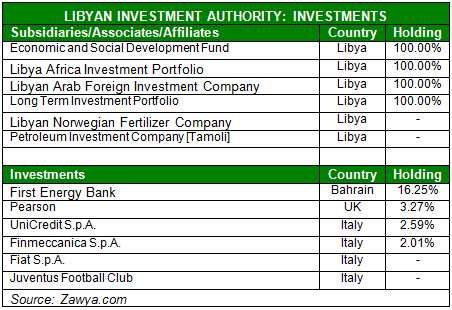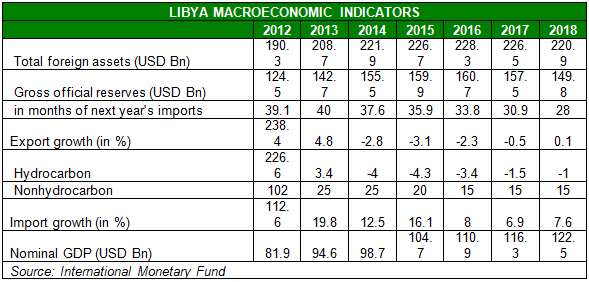The outlook for Libya is grim as it slides further into anarchy, but the African Development Bank believes that one promising area is the country's formidable financial resources and a sovereign wealth fund that could be leveraged to help the economy.
In a recent report on Libya, the African Development Bank looked to "re-engage" with the country to seek a better understanding of economic and political developments amid political instability, threats to the survival and legitimacy of the state, and regional tensions over control of country's rich natural resources.
The oil sector, the lynchpin of the economy, has been crippled by factions fighting over control of the resource. A deal reached in April between the government in Tripoli and federalist rebels in the eastern region occupying four vital export terminals has unraveled over opposition to the appointment of the new prime minister.
Oil revenues accounted for nearly 93% of public finances, so its interruption is a self-inflicted wound by the country's various militia groups.
"While the new Libyan government and state institutions strive to consolidate their power and control over the country, occasional forms of instability threaten the state's stability and divert attention away from development planning and towards security management," the AfDB said.
SOVEREIGN FUND REFORMS
Given Libya's vast foreign exchange reserves and investment resources, it is essential for the Libyan authorities, in a break from the past, to design a carefully targeted investment strategy, the AfDB recommends.
The country's investment resources fall under the umbrella of the Libyan Investment Authority (LIA) and its subsidiaries, however, the AfDB notes that the authority "lacks a clear and comprehensive view" of the country's domestic and international investments.
The LIA holds USD 66 billion in investments, according to the Sovereign Wealth Fund Institute, while total gross reserves exceed USD 200 billion.
"Lack of institutional capacity and the slow pace of reforms within the LIA and its subsidiaries have prevented rapid progress with the recovery and better management of these investments which could act as an engine of productive growth and employment generation in the country," the AfDB said.
With unemployment creeping up to 13%, the country's population is frustrated to see that the departure of the previous regime -- which came at a great price for many Libyans -- has not improved their own economic and social standing.
Apart from the LIA, a number of inefficient and unfocused smaller sovereign wealth and investment funds had mushroomed under Muammar Gaddafi's regime, which could become a key component of the country's economic transformation drive.
"However, the new Libyan government aims to reform the structure of these funds and incorporate the more fully and efficiently to the country's economic development framework," the Bank said.
The government also aims to trace, consolidate and expand Libya's investments domestically and regionally. This will allow the authorities to diversify Libya's revenue sources and economic transformation, and channel investments in infrastructure, utilities and small-tom-medium development, and also expand Libya's portfolio of active and productive investments across Africa.
RESOURCE GOVERNANCE
Reforming the LIA and other funds is part of a broader need to improve the Libya's resource governance. The country is home to the largest oil reserves in Africa at 47.1 billion barrels of oil, apart from 52.8 trillion cubic feet of natural gas -- among the 1o largest conventional reserves globally.
Its proximity to Europe could make it a valuable and strategic energy partner to the continent, especially as the EU looks to wean itself off Russian energy supplies, in the aftermath of the events in Ukraine.
Yet, only 25% of the country's territory has been explored for hydrocarbons.
"These resources provide the country with ample financial leverage and a positive long-term fiscal outlook, resulting in a very low debt stock measuring only at around 2% of GDP," the AfDBP said.
"If utilized efficiently, these resources can be the engine of economic diversification and employment generation, the basis for an enhanced and diversified investment strategy, and provide the resources for generous and efficient public service delivery."
These are valuable recommendations that, if implemented, could help the country get back on its feet. But these suggestions presume that there is political cohesion and some semblance of order in the country.
The feature was produced by alifarabia.com exclusively for zawya.com.
© Zawya 2014




















